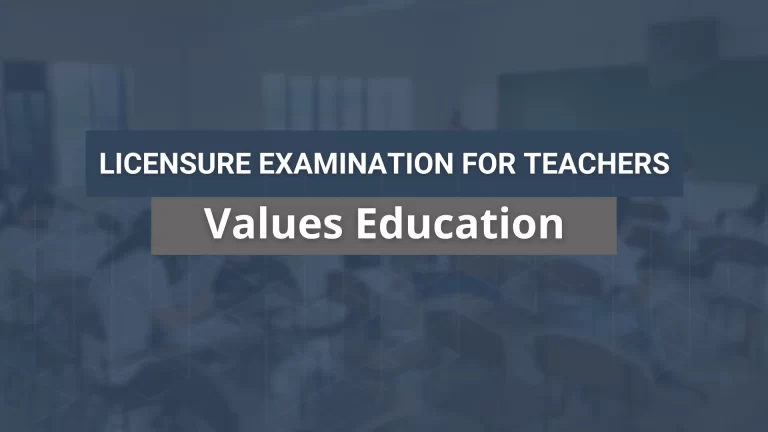This is the Multiples Choice Questions Part 3 of Values Education. In preparation for the LET Exam, practice, and familiarize every question we have, it might be included in the actual examination. Good luck.
Be fully prepared for your exam, follow our tips on effective studying and test-taking strategies. Click here to read the tips:
| There are two sides of the coin, to pass the board exam or to fail it |
| Top 10 things to do in case you will not pass the board exam |
| After passing the board exam, what is your next move? |
| More… |
Values Education Part 3
1. Which of the following signify human nature according to theory of Hobbies? Human being are:
a. Composed of body and soul
b. Physical objects
c Moral agents
d. Vegetative
Answer: a
2. Which virtue aids one to face life’s difficult and trails?
a. Justice
b. Prudence
c. Temperance
d. Fortitude
Answer: a
3. One way to raise one’s level of cognitive consciousness or awareness is to begin thinking with:
a. Teaching as a process
b. “if-then” logical paradigm
c. Dynamic interaction
d. The “Pros-Cons” technique
Answer: c
4. The cognitive aspect of the valuing process wherein the individual process wherein the individual has a full understanding of the consequences of each option being considered is:
a. Prizing and cherishing
b. Choosing Freely
c. Choosing from alternatives
d. Choosing reflective
Answer: b
5. The main reason for pursuing all other value is:
a. That man’s personhood is transcendent
b. The inner worth of the human person
c. The each person is endowed with faculty of free choice
d. The each individual capable of rising above the materials
Answer: d
6. Values have a social function when:
a. They become the vehicle for the transmission of learning
b. Commonly held values unite families, tribe, societies and nation
c. The process is just cognitive but involves all the faculties of the learner
d. They have a direct and immediate relevance to the personal life of the learner
Answer: c
7. The Affective Cognitive Experiences for Self Direction Methodology:
a. Defend on the learner’s creativity
b. Constitute the content of values education
c. Increase the teachers wealth of experiences
d. Make use of the experiential and the confluent learning approaches
Answer: a
8. At the core of the valuing process is an ongoing process of using one’s Innate capacities and potentials in full, creative and joyful ways called:
a. self direction
b.Introspection
c. Self actualization
d. Symbolic self completion
Answer: a
9. The supreme and overarching value that characterizes education on the basis of the foregoing philosophy of the human person is:
a. Human personality
b. Human dignity
c. Human conscience
d. Human body
Answer: b
10. Which of the following is/are condition/s to economic efficiency?
I. Deep sense of work ethics
II. The use of capital for family enterprises
III. Accelerated Productivity through job efficiency
IV. Self-reliance and discipline economy
a. I, III and IV
b. II and IV
c. II, III and IV
d. I and II
Answer: d
11. What approach is used when a science teacher emphasizes the value of intellectual honesty and respect for the emergence of new knowledge in teaching science concepts and acquiring scientific skills?
a. Values integration
b. Value analysis
c. Values inculcation
d. Values clarification
Answer: c
12. The family is still and the most dominating factor affecting values development because:
a. Parents are always the best role models
b. Values are the first taught and caught in the family
c. The family and home environment are roots of the Filipinos character
d. The conduct of the Filipino is very much determined by the social values of the family
Answer: c
13. For the goal of developing a sense of integrity and accountability, government officials and employees should:
a. Keep performance records
b. Be given value clarification seminars
c. Get rid of useless, meaningless rules
d. Be given recognition awards or incentives
Answer: b
14. Which of the following operative Filipino Values most specifically need some modification so that they can propel other values for the common good and social justice?
a. Obedience and respect to leaders
b. Utang na loob ang pakikisama
c. Ningas cogon ang bahala
d. Hospitability and bayanihan
Answer: b
15. Values Education requires parents to fulfill three main goals except on:
a. To instruct in universal truth and moral principles
b. To help from a delicate and certain conscience
c. To encourage the practice of virtues
d. To view a child as mini adult
Answer: c
16. The following are the task of politicians except one:
a. To be brave and dutiful
b. Not only to lead, but to educate citizens as well
c. To sponsor and encourage people to behave in a certain way
d. To manipulate the political system, to ensure order accordance w/ the existing laws
Answer: d
17. Which of the following practices is exclusive to an authoritarian family?
a. There is consultation with the family members before making decision
b. Parents inculcate the right and responsibilities of every member
c. Parents know everything more than any member of the family
d. There is freedom in the practice of democratic rules.
Answer: b
18. Every human person can’t live without others, This means that the human person is essentially a/an ______ being:
a. Dependent
b. Free
c. Incarnate
d. Being
Answer: b
19. In which of these cases, does peer pressure become most critical?
a. When the peers values contradict with parental moral instruction
b. When the parents disapprove of the peers of his/her child
c. When the adolescent badly gives in to peer pressure
d. When parents are unaware of his/ her child’s peers
Answer: d
20. Which technique/ method in values education is most appropriate when you want your student to take a stand and justify that on a moral issue?
a. Values clarification
b. Inculcation
c. Moral Dilemma
d. Role playing
Answer: c


